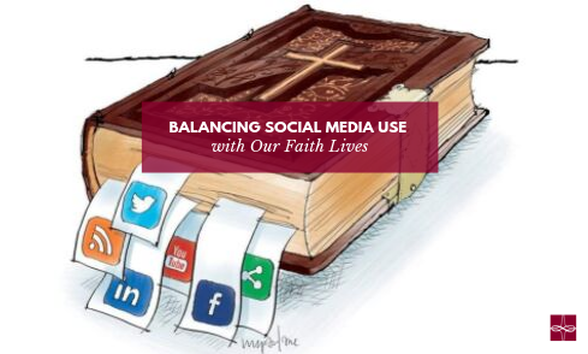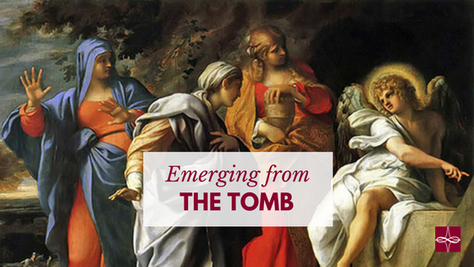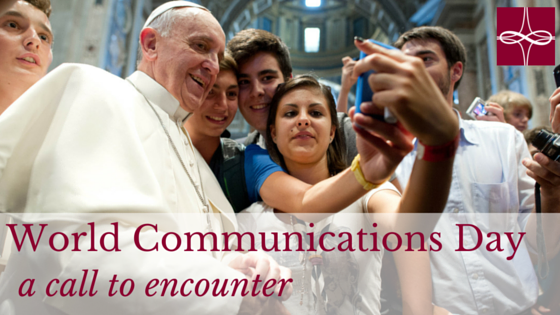|
Social media has been gaining momentum in the Catholic world since the mid-2010s; however, since the COVID-19 pandemic began, digital evangelization and virtual faith-sharing have become even more important and prevalent. Because in-person liturgies, retreats, and daily interactions were not possible, Church organizations across the U.S. began to increase their digital footprint. Although the Catholic Apostolate Center has used technology and social media as tools for evangelization since its inception in 2011, the COVID-19 pandemic also led the Center to a greater focus on digital evangelization and online formation tools. As an intern with the Catholic Apostolate Center, my time has been punctuated by helping people encounter the Church and faith formation more positively. Specifically, expanding the Center’s courses on Catholic Faith Technologies’ e-learning platform and building an app for the Immaculate Conception Province of the Pallottine Fathers and Brothers has allowed me to create new ways for people to encounter Jesus Christ and learn more about Him. Pope Francis has followed the footsteps of his predecessors by encouraging the Church to continue evangelization over the internet. Our Holy Father has stressed the importance of using the technological means available to us today in order to proclaim the Gospel “to all the nations.” This evangelization can come in many ways and forms, and the Catholic Apostolate Center has embraced this understanding since its foundation. This summer, I have been working on adapting the Center’s “Apostles on Mission” in-person course to be an asynchronous course online with Catholic Faith Technologies’ e-learning platform. As a secondary education major, I was able to hone my skills as an educator by looking at the lesson outlines and plans and advising a break, an activity, or a different method of conveying the content to increase engagement. This project has also helped me look at what intellectual faith formation means and why it is so pertinent to the spiritual life. Formation in the Church calls us to learn more about Jesus, the Church, our Faith, and our own strengths and weaknesses. However, with the advent of the internet, we must cast the net over the right side of the boat, as Jesus calls us, to reach more people and continue to spread the Gospel message. Expanding digital resources for faith formation allows all the faithful to grow closer to our Lord. Digital evangelization can also allow for a more profound personal encounter with Jesus Christ. As seen throughout the pandemic, prayer resources can help people feel connected to the greater Church community. People want to experience various types of prayer to delve deeper into the spiritual life. The Catholic Apostolate Center has been working tirelessly this summer to create a prayer app for the Immaculate Conception Province of the Pallottine Fathers and Brothers. This app—entitled “Revive & Rekindle”—will assist the Pallottine community and the general faithful in growing closer to Christ through the spirituality of St. Vincent Pallotti. This project has allowed me to make two important observations about the Catholic faith. First, we must promote various forms of prayer and devotion to help the faithful find the styles of prayer that best suit them. Second, prayer and devotion must be disseminated and promoted in different media to spread the Gospel message to as many people as possible. The “Revive & Rekindle” app will allow people to grow closer to Jesus through reflections and prayers inspired by St. Vincent Pallotti, who urges us all to become Apostles for the Lord. As a strong proponent of the New Evangelization, Pope Francis encourages us to enter the digital landscape to encounter people and bring them closer to Christ. The Church can only do this through intentional formation and by promoting an encounter with Christ online. As an intern at the Catholic Apostolate Center, I have grown professionally, personally, and, most importantly, spiritually. Working with the Center, I have concretely realized what Pope Francis means when he urges young people not to “wait until tomorrow to contribute your energy, your audacity and your creativity to changing our world. Your youth is not an “in-between time” (Christus Vivit). A vast majority of people in the United States have social media, and since many Catholics are among this number, we have to preach the Gospel on all channels and encounter others and Jesus Himself through means of digital formation and evangelization. We must reach out to all corners of our world and society to be Apostles on mission for Jesus.
0 Comments
I had my third baby in the spring, during the first phase of our area’s government-mandated shutdowns. As with my previous two children, I often found myself tiredly scrolling through social media during countless midnight nursing sessions. And everywhere I looked, I saw discord. Strangers on the internet “crushed” each other with one-liners, ignored or belittled those with whom they disagreed, and twisted the meaning of words to suit their argument’s ends. But I also saw members of local church communities getting into heated arguments that were exacerbated by the email writers’ inability to see each other and hash out their ideological disagreements in person. “Is civil discourse completely dead?” I wondered to myself.
It’s easy to think that if we just say the right thing at the right time our interlocutor will see the error of their thinking and agree with our side of the argument, or that if we pummel our interlocutor with the harsh and unadulterated truth that they will be overwhelmed and converted like St. Paul on the road to Damascus. The ability for everyone to have a voice in the public square via social media and to be able to interact with virtually anyone, at virtually any time, on virtually any topic, has warped our society’s self-control about when, and how, and about what to offer an opinion. Appropriately for this topic of charitable dialogue, today is the feast day of St. Thomas Aquinas, thirteenth-century philosopher and theologian and one of the greatest minds the Catholic Church has ever known. He was exemplary in his efforts to understand and articulate opposing viewpoints and to be thorough and charitable in his defense of faith through reason. Each broad topic he addresses in the Summa Theologiae, his magnum opus, is broken into more specific questions, which are broken into even more specific questions called articles, and for each of these articles Aquinas offers well-thought-out objections before he states his own thesis and then replies to each individual objection. What a difference from our modern culture that is steeped in out-of-context sound bites, Twitter smackdowns, unnecessary generalizations, and logical fallacies! If our calling as followers of Christ is to reflect Christ for others and to evangelize, we ought to be intentional about how we may be the face of God for someone else. If I am the only Christian someone is going to encounter that day—be it in line at the grocery store or on a Facebook comment section—how would I want that experience to be? Sometimes I need to remind myself that no matter how willfully defiant my child is being, no matter how obtuse my acquaintance’s social media post is, that they are unconditionally loved by God, and I am called to love them too. Personally, I have learned not to engage at all in a potential argument on social media. And when I do have disagreements with others, like St. Thomas Aquinas, I try to make sure that I understand the scope of my opponent’s reasoning and what he or she is actually trying to argue before I respond. It is possible to be charitable toward and understanding of others without abandoning the Truth or condemning everyone around us. Perhaps most importantly, I have learned that the virtual world of the internet and social media is best when used to support our lives and relationships in the real world, not as a replacement for them. As we continue into this new year of 2021, I encourage you to think about how you can charitably engage with those you may not agree with. May we look to the model of St. Thomas Aquinas as we seek to evangelize today’s culture with love. \We are once again in the midst of the liturgical season of Lent. These forty days before the Triduum are opportunities to prepare ourselves to enter into the Passion of Christ through penitential practices such as prayer, fasting, almsgiving, and self-sacrifice. Done correctly, our Lenten practices can be cathartically cleansing as we imitate Christ’s forty days in the desert after His baptism. This incredible withdrawal of the Lord from the outside world to dwell on the calling of His Heavenly Father before the commencement of earthly ministry remains a model for us all. During Lent, the faithful do not isolate themselves from the world in fear but rather draw strength from Christ. Shaking off the comforts and complacencies of living in the world may be a bit jolting, but our ultimate goal is holiness; anything else is just a noisy distraction which can never truly satisfy our deepest desires. Today, technology has become integrated into our lives and relationships. Social media, the internet, and the incredible utility of our smartphones may occupy a large part of our daily attention. It’s no wonder we can find it harder to disconnect from the outside world. Indeed, while the proper and moderated use of technology can be beneficial, observing the dangers of failing to unplug from the world (i.e., harming real human connections), has helped deepen my appreciation for the isolation opportunities afforded by Lenten observances. Lent calls each of us to remember the ultimate sacrifice God Himself made on Good Friday. This salvific act is so significant that it cannot be restricted to just one day on the liturgical calendar. The Church commemorates Jesus’ Last Supper, Passion, and Death during the Triduum. As these days draw near, the faithful are called to prepare themselves to enter into the Paschal Mystery by putting aside our worldly comforts and imitating how our Lord spent precious time among His disciples before His death. While Lent is an increased time of preparation and time of intentional growth in holiness, the Church has no shortage of opportunities to deepen our relationship with the Lord year-round. Sunday Mass offers us the spiritual nourishment and proper grounding to start each week. The choices we make in the hours or days following Mass can build upon the scriptural and sacramental foundations laid during the service. Recommitting ourselves to our families and their needs can strengthen the love binding us together; praying with and serving each other builds up the domestic church. For example, volunteering to lead devotional prayers together as a couple or family is a beautiful expression of intimacy and faith. Additionally, during Lent and beyond, we may replace screen time with spiritual reading so we can be inspired by the writings of saints or theologians and discover new avenues of holiness for our lives. Certainly, we can sacrifice a worldly comfort during Lent, but we can also perform charitable works and make a difference in the lives of others during this season. Lent is not a diet! Lent is intended to bring us closer to God, Who is found not in the noise of the world, but in the quiet whisperings of an open heart. Prayer enables us to make room in our hearts for Him to dwell in the temples of our bodies and radiate through our lives. We cleanse ourselves of distractions that prevent us from the holiness He calls us to and we commit ourselves to prayer, fasting, and almsgiving. We repent of our sinful shortcomings and avail ourselves of the sacraments of the Church. Our desire to accompany our Lord can be fulfilled by our faithful vigilance in Eucharistic Adoration, especially in the nighttime hours when our “spirit is willing, but the flesh is weak.” Our Lord is present in the Eucharist we receive at Mass, the Sacrament we adore, the family we are a part of, and the people we serve. He is always ready to not just be a relegated part of our lives, but the core of our very being. The season of Lent can serve to motivate us to choose the better part rather than be complacent in the empty comforts of the world. Though we seek isolation from the distractions of the world to accomplish a meaningful and fruitful Lenten observance, we are promised by the Lord God Himself that we never walk alone when he says: “I am with you always, until the end of the age.” For more resources to accompany you throughout your Lenten journey, please click here. As a communications manager who handles the social media accounts for my day job, I’ve had to work at and learn how to better manage my time spent on social media. While this technology is an exciting and ever-evolving resource for sharing and obtaining news, I’ve found social media can also drain my energy or keep me from my priorities. Within the last year, I noticed I was spending four or more hours a day on social media and browsing the Internet. I saw my spiritual life was being affected, so during this past Lent, I decided to do something about that imbalance. I knew I still needed social media for work use, and I discovered a solution. By implementing the screen time and do-not-disturb settings on my phone, I found I could limit my social media consumption to an hour per day. Whatever time was left after work allocations I could spend on personal social media time. Most days I used 45 minutes or the whole hour for work. I came to appreciate that my time was spent elsewhere in a more productive manner. I used the time for additional prayer, reading, church, conversations with friends, and other enjoyable activities. My brain didn’t feel as fuzzy and scattered with random bits of information that would send me off the paths toward my personal, professional, and spiritual goals. After Lent, I took off the screen time and do-not-disturb parameters on my phone due to an evening work event. Since then, I’ve turned them back on. This experience of self-reflection and adjustment of my behaviors reminded me of why God provides us with commandments: to set us free from sin in order to allow us to become more perfectly the people he created us to be. By growing in self-awareness and setting self-imposed boundaries, we can better harness social media for the good. Here are a few questions to consider that I have found help me when evaluating my time spent on social media: (1)Are you present to those around you? People using their digital devices when in the company of others is a growing trend – and a sad one at that. Instead, we should put away our devices and give our attention and time to those in front of us. Being fully present to those we are spending time with in-person shows that we are investing in our relationships and affirming their humanity. By being present to those around us, we respect them and uphold their dignity. (2)Do you let social media distract you from God and others in your life? Have you formed the habit of checking your phone every couple of minutes or felt the non-existent buzz of a notification? Have you moved to autopilot looking through your social media feeds or gone down the rabbit hole of an internet or video search only to see that one, three, or more hours have gone by? This reliance on our phones provides great distraction in our lives, making us susceptible to temptation. We should work to embrace silence with ourselves and with God. By scheduling solitude with God in prayer or time for ourselves to be constructive, we come to know God’s path for us and how he calls us to give of ourselves to others in love. (3)Ask yourself, “Do you really need to share this moment?” With 24/7 access to an inside look at our life’s daily moments through social media, we seem to have lost a sense of privacy and humility. Before posting content to social media, consider the discretion of the moment. Check with family, friends, and significant others if something including them is appropriate to post. Respect their space and yours. Ask yourself why you’re posting the content you want to share and check your motivations. (4)Do you view social media as an outlet that steals your happiness or as a way to share your joy? There is much truth to the adage, “Comparison is the thief of joy.” Comparing ourselves, our possessions, our appearance, our jobs, our wealth, and our relationships to those of others prohibits us from feeling gratitude for our blessings and can derail us from our personal goals. Thanking God for at least one thing a day can help cultivate a spirit of joyfulness, allowing us to celebrate, learn from, and be happy for others around us. (5)Do you feel isolated when spending time on social media? Social media can be a great way to connect with Catholic communities. Personally, I enjoy the discussions and fellowship that Facebook groups cultivate. However, we must be cautious of the temptations to become a technology hermit, as Pope Francis warns of in his 2019 World Day of Social Communications message, or posting “for the sake of Instagram” or self-interested comments. (6)How do you treat others on social media? What we say on social media and Internet comment sections matters. Pope Francis encourages Catholics to live out the faith through social networks as the Body of Christ, welcoming others. As the United States Council of Catholic Bishops’ social media guidelines, we as the Church “can use social media to encourage, respect, dialogue, and [cultivate] honest relationships – in other words, ‘true friendship.’” By living out our faith through the example we set in loving others on social media through our posts and comments, we reveal Christ. In this world of artificial connection, can we still discover and grasp an authentic connection within ourselves to our Triune God? Many of us are technologically connected throughout the day and into the evening, whether it be through social media, texting, e-mails, the Internet, or general screen time. In a normal day-to-day setting, take a moment to reflect on how often you have face-to-face time to truly speak with and connect with your family, peers, friends, or co-workers. In those moments, are you able to reach beyond a superficial level of connection? Oftentimes amidst the busyness of our lives, schedules, commutes, and responsibilities, we find it difficult to truly maintain a connected relationship with others that goes beyond our phone, tablet, or computer screen. If maintaining this human connection has become difficult, how much more difficult is it for us to find those moments of quiet, internal spiritual connection to God? Our society and technology have fooled us into believing that all of this quick and easy access has made it easier than ever to keep in touch with those that mean the most to us. And yet oftentimes it has instead succeeded in building walls of electronic screens not only between us and others but, more importantly, between us and God. There are many things that resonate between our physical, or exterior, and our spiritual, or interior, lives. What is the equivalent “screen time” in our spiritual lives? Where are we holding onto surface-level connections instead of digging deeper into our relationship with God and growing in our spiritual life? Are we holding onto a barrier that is holding us back from maturing in our spiritual development? Just as we grow, develop, and mature in our physical lives, we are called to do so in our spiritual lives as well. Today, we celebrate and commemorate the life of Saint Teresa of Jesus, also known as Saint Teresa of Avila. Saint Teresa was a spiritual writer and mystic. She is one of four females to be named a Doctor of the Church, meaning that her spiritual writings have been given special authority. Her teachings, writings, and life can point us in the direction of growing in our interior life and thus growing in our faith and connection to God. In Saint Teresa’s spiritual writing The Interior Castle, she likens the stages of growth and development of our interior life to seven mansions within a castle. Saint Teresa describes the dwelling of God within us as residing in the seventh mansion of our castle. Through the growth and development of our spiritual life, our soul is to journey through the mansions to find its rest within the seventh, the kingdom of God. The first step in entering the castle is prayer. Saint Teresa teaches that, “Souls without prayer are like people whose bodies and limbs are paralyzed.” Let’s take a moment to reflect on our prayer life. Are there any “electronic screens” standing in the way of deepening our relationship and our conversations with our Creator? Are we connecting to God in our prayer life as if we are updating our Facebook status or posting our latest photo to Instagram? Or are we really striving to power down the screens of distraction in our life to speak with God AND listen to Him? Let us turn to the life of Saint Teresa as an example and inspiration for our desire to develop the maturity of our soul. The next time you enter into prayer, “Go to your inner room, close the door, and pray to your Father in secret.” (Matthew 6:6) If we look at these words of Scripture through the lens of Saint Teresa’s teachings, we must pass the walls of our castle, our body, in order to enter our inner room. Allow yourself a few moments to quiet and calm the body in order to turn your focus to God. Take time to power down the screen. Close your eyes and breathe deeply. The Divine Physician has created our body in such a way that by slowing and deepening our breath rate, our heart rate and blood pressure decreases, our muscles relax, and the racing thoughts of our mind slow so that we can focus on one Triune thing, our God. In this state of quiet and calm, invite the Holy Spirit into this moment and seek a true, contemplative connection in prayer with your Creator. I would like to close with a prayer often attributed to Saint Teresa of Avila: “May today there be peace within. May you trust God that you are exactly where you are meant to be. May you not forget the infinite possibilities that are born of faith. May you use those gifts that you have received, and pass on the love that has been given to you. May you be content knowing you are a child of God. Let this presence settle into your bones, and allow your soul the freedom to sing, dance, praise and love. It is there for each and every one of us.” Saint Teresa of Avila, pray for us! The call to evangelize is at the heart of our Christian faith. We are evangelizers at our core; it makes up our very identity. And yet, if I were to ask most people sitting in the church pews at Mass if they are evangelists, they would probably shake their heads and identify themselves in other terms: vocation, occupation, role in the family, country of origin. A professor of mine in graduate school put it starkly when he said most of the laity are experiencing an “identity crisis.” We do not know, or have forgotten, who we are as members of the Body of Christ and what our role is within it. Today, Pope Francis echoes his predecessors in reminding the laity of their call to become missionary disciples. This is a call that originates from God Himself, with the Risen Christ saying to his beloved disciples before ascending to the Father, “Go and make disciples of all nations.” These words reverberate ever more powerfully for us today. Though the universal call to holiness and a greater emphasis on evangelization has roots in the papacy of Pope Paul VI and within the Second Vatican Council, Pope Francis calls the concept of sharing our encounter with Jesus Christ using the means available to us “missionary discipleship.” It is a profound concept that Pope Francis assures us is relatively simple. “The new evangelization calls for personal involvement on the part of each of the baptized,” he writes in Evangelii Gaudium. “Every Christian is challenged, here and now, to be actively engaged in evangelization; indeed, anyone who has truly experienced God’s saving love does not need much time or lengthy training to go out and proclaim that love.” Once we have encountered Jesus Christ and His merciful love, we are called to bring that encounter to others, therefore playing a unique role in salvation history. Several of my colleagues from the Catholic Apostolate Center and I were honored to discuss “The Call to Missionary Discipleship” at the Catechetical Day hosted by the Archdiocese of Washington in late October. We discussed that, as baptized Christians, we have been given the grace of Jesus Christ in order to respond to the both daunting and exhilarating call to “go out to all the nations.” This understanding of evangelization subsists not only on our personal encounter with God’s transforming love, but also on our proclamation of it. It is not enough to encounter Jesus Christ for ourselves. Like the woman at the well, we must go forth telling anyone who will listen, “Come see a man who told me everything I have done.” Below are five practical tips we came up with for living out the call to be a missionary disciple. What are we missing? Feel free to add to our list by commenting on our post below! 1. Collaboration If we are to be missionary disciples, we must be people of collaboration. This does not mean that we attend endless meetings, join committees, or fill every moment of our schedule. We propose collaboration from the beginning, which means a willingness to begin an endeavor communally with others—recognizing the valuable role each person has. Collaboration must happen among, for, and with those in our parishes and organizations. It requires openness to the promptings of the Holy Spirit, humility, dialogue, and flexibility. How can you learn from others in your community, parish, family, workplace, or neighborhood? How might God use the gifts and talents of a diverse group of people to strengthen His kingdom on earth? 2. Technology As followers of Jesus Christ, we are called to use the tools of this present age in order to re-present the Gospel to our world in a way that is innovative and re-invigorated. A major tool today that can be used to spread the Gospel message is technology, especially the internet. We can share digital content that is valuable, such as Scripture, the Catechism, and Papal and Conciliar documents, in order to become better informed about our faith. Technology can also create a new type of community, enabling us to connect with others and share information in a way that is cost-effective and not limited to physical proximity. What are some ways you can use technology to spread the Gospel and help build a civilization of love? 3. Community/Parish Life We do not exist in isolation. As Christians, our work of evangelization will not bear much fruit if we do it alone. Our community, especially our parish, strengthens us and equips us to go outside our church walls in order to evangelize. It is within the parish that we receive the sacraments, especially the Eucharist, which gives us the grace of Christ Himself. In order to be effective as missionary disciples, we are called to have a vibrant sacramental life strengthened by our communities. How does your parish community strengthen you for your mission of discipleship? 4. Relationships Relationships outside of the parish are also crucial to missionary discipleship. As mentioned above, we do not exist in isolation. Do we have a mentor or spiritual guide helping us to grow in our faith life? Do we have relationships or friendships that hold us accountable and push us to become better witnesses of faith? By developing faith-filled relationships and surrounding ourselves with mentors and guides, we ensure that we continue to grow in our role as missionary disciples. 5. Prayer Prayer is crucial not only to a life of missionary discipleship, but to the Christian life overall. Prayer is the foundation for our relationship with God, inviting us to get to know ourselves more deeply through his gaze of love and mercy and helping us to better understand our specific mission in building up the Body of Christ. Prayer can, and should be, both personal and communal. God speaks in the silence of our hearts, as well as through others. Are we carving out time in silence to converse with God and hear the promptings of the Holy Spirit? Do we read Scripture, pray the Rosary, journal, sing hymns, or reflect? By having an active prayer life, we will be better equipped to become fruitful missionary disciples. The call to missionary discipleship is both daunting and exciting, and we can live it out at any time. As Pope Francis wrote in Evangelii Gaudium, “Being a disciple means being constantly ready to bring the love of Jesus to others, and this can happen unexpectedly and in any place: on the street, in a city square, during work, on a journey.” Above, I’ve listed a few tips to fulfilling our call to become missionary disciples. What would you add to the list? Editor's note: This post was originally published in November 2017. Since its publication, the Catholic Apostolate Center has expanded its vision and resources for living as missionary disciples. Please see our "Living as Missionary Disciples" resources page and our 2017 e-book Living as Missionary Disciples: a Resource for Evangelization that was produced in collaboration with the USCCB. Half of America is single. The hook-up culture and age of technology have greatly changed the way people date; the script for traditional dating is often considered unpopular and “outdated.” Despite all of this, people still desire authentic, meaningful relationships. This illustration of the typical modern dating scene is explored in a film called The Dating Project, a new documentary that follows five single men and women, ages 18-40, as they navigate the dating landscape on their search for lasting relationships. (The film’s executive producer is Steve McEveety, who also produced The Passion of the Christ and Braveheart). I found the film to be honest and, at times, humorous. All the main characters are unscripted, and I felt their stories accurately portrayed the frustrations many of us have experienced in today’s confusing dating world. The Dating Project was inspired by Boston College professor Dr. Kerry Cronin’s infamous “dating assignment,” which Dr. Cronin developed after learning her students didn’t know how to ask someone else out on a date. In the assignment, each student must ask another person on a “Level 1 Date” following a certain set of rules. While some critics call Dr. Cronin’s dating rules old-fashioned, her rules actually encourage getting to know a person for who they are—without sexual expectations. The goal of a Level 1 date is purely for information gathering. Dr. Cronin outlines specific rules for this first date:
These rules emphasize that dating should be about getting to know a person, appreciating his or her qualities and determining whether they are the type of person you would like to eventually explore a long-term romantic partnership with. When we lose sight of this, we are only seeing men and women as commodities – mere sources of pleasure or satisfaction for ourselves in the short term. We are called, instead, to recognize that all people are made in the image and likeness of God—which is difficult to do when you think of only how another person can benefit you. We have to be mindful of not falling into what Pope Francis calls a “throwaway culture” when it comes to relationships. We aren’t shopping for a product on Amazon, after all. By the conclusion of the documentary, we see the five individuals who serve as the focus of the film progress in their confidence when it comes to dating and relationships. The college students who participated in the dating assignment remarked that asking someone out on a date in person was a much better feeling than a hookup. They said they would continue this way of dating in the future. I was most impressed with the change in the 40-year-old man. He led a more non-committal lifestyle when it came to relationships and by the end, I could tell the questions the directors asked him, such as, “If the woman of your dreams walked up to you, what would you say?”, had made an impression on him. He thought more deeply about how he viewed women as daughters of God, he could imagine himself in a long-term relationship, and he felt like dating within the parameters of the assignment allowed him to avoid temptations more easily. As children of God, we are called to a higher standard than what our culture provides. We need to step up as Catholic men and women and change the dating narrative. We must be courageous! As Pope Saint John Paul II says in his letter to families, “Do not be afraid of the risks! God’s strength is always far more powerful than your difficulties!” Today we celebrate the fifth anniversary of Pope Francis’ pontificate. In these short years, Pope Francis has done much to continue the work of his predecessors in building a culture of evangelization and inviting each member of the Church to live out their baptismal call as missionary disciples. Several important Church documents have been released throughout his papacy, including Evangelii Gaudium, the Apostolic Exhortation on the Proclamation of the Gospel in Today’s World, Laudato Si’, the encyclical on Care for our Common Home, and Amoris Laetitia, a post-synodal Apostolic Exhortation on Love in the Family. Pope Francis has participated in two World Youth Days, made roughly 22 international apostolic visits, and has canonized 885 saints. He called for the Jubilee Year of Mercy from 2015-2016. I would like to celebrate the fifth anniversary of his election by sharing some quotes that characterize his papacy and capture its tone.
1. A Church on Mission "I prefer a Church which is bruised, hurting and dirty because it has been out on the streets, rather than a Church which is unhealthy from being confined and from clinging to its own security… More than by fear of going astray, my hope is that we will be moved by the fear of remaining shut up within structures which give us a false sense of security, within rules which make us harsh judges, within habits which make us feel safe, while at our door people are starving. -Evangelii Gaudium, 49 Pope Francis envisions a missionary church—one with open doors to welcome people in, but also for each of us to step out and bring the Good News of Jesus Christ to the world. As Christians, it can be tempting to remain within the safety of our parish and Church community. However, Jesus calls us to “go out to the nations” and encounter the hurting world. Pope Francis reminds us of this evangelizing spirit entrusted to us by Jesus Christ and challenges us to be a Church on mission. 2. The Inherent Dignity of Mankind and Creation “Our insistence that each human being is an image of God should not make us overlook the fact that each creature has its own purpose. None is superfluous. The entire material universe speaks of God’s love, his boundless affection for us. Soil, water, mountains: everything is, as it were, a caress of God.” -Laudato Si, 84 About two years into his papacy, Pope Francis released his encyclical Laudato Si’, focusing on our responsibility as stewards of creation. No other pope has dedicated an entire encyclical to the care of creation. In doing so, Pope Francis reminds us that all of the created world helps us to glimpse and better know God Himself. Mankind is the pinnacle of creation, made in God’s image and likeness. In Laudato Si’, Pope Francis reminds us of each person’s inherent dignity, made with his or her own purpose, gifts, and mission. 3. The Transformative Power of Christ’s Love “Jesus’ love goes before us, his look anticipates our needs. He can see beyond appearances, beyond sin, beyond failures and unworthiness…He sees beyond this, to our dignity as sons and daughters, a dignity at times sullied by sin, but one which endures in the depth of our soul. He came precisely to seek out all those who feel unworthy of God, unworthy of others.” – Homily at Plaza de la Revolución during his Apostolic Journey to Cuba At the heart of the Christian life is an encounter with Jesus Christ. His love is transformative, life-changing. We encounter Christ in prayer, the sacraments, the parish, in one another. However, we cannot overestimate the importance of our prayer life—of moments throughout each day in which we enter into dialogue with God, offer up our work and sacrifices, remember the needs of others, or give God praise. When we carve out time each day for prayer, we are better able to know the look of Christ that goes beyond the worldly way of seeing things into our dignity as sons and daughters of God. 4. The Role of the Church in the Christian Life "We cannot understand Christ without his Church, just as we cannot understand the Church without her spouse, Christ Jesus, who gave his life out of love, and who makes us see that it is worth the price.” -Prayer Vigil for the Festival of Families in Philadelphia I love this quote because it sums up the relationship between Christ and His Church. We cannot know Christ apart from the Church, just as the Church cannot exist without Christ. Christ founded the Church in order to be a place of encounter with Him through the sacraments and through one another. We come to more fully know the love of God in the life of each parish. How can we create communities of encounter in our various parishes? Is the light of Christ truly shining forth in our communities? 5. The Messiness and Joy of Family Life “I thank God that many families, which are far from considering themselves perfect, live in love, fulfill their calling and keep moving forward, even if they fall many times along the way. The Synod’s reflections show us that there is no stereotype of the ideal family, but rather a challenging mosaic made up of many different realities, with all their joys, hopes and problems.” -Amoris Laetitia, 57 Pope Francis speaks realistically of human life and love. The family, the domestic church, is not perfect. We are called to learn and grow in love throughout our entire lives, just as we are called to learn and grow in holiness. The family is the place where love is mastered and refined. It is the foundation of society and of the Church. Pope Francis calls families to journey joyfully on the path of love. He invites us not to fear our imperfection, but to keep moving forward in hope and joy. 6. Not Letting Fear Impact Vocational Discernment “The work of discernment identifies our fears and can then help us to overcome them, opening us to life and helping us to calmly face the challenges that come our way. For us Christians in particular, fear must never have the last word but rather should be an occasion to make an act of faith in God… and in life!” -Message for World Youth Day Panama In preparation for the 2018 Synod on Young People, the Faith and Vocational Discernment and World Youth Day 2019 in Panama, Pope Francis spoke of the process of discernment, especially for young people today. Fear is often at the heart of our actions—or inaction. Christians, however, have no cause for fear. As we discern God’s call for our life each day, let us place our trust in Him and act with courage and boldness. God has created us for a unique mission that only we can fulfill in His Church. Let us discern his will for us, as Pope Francis encourages, “trusting that he will lead us to a good end.” 7. The Importance of Contemplating and Encountering God’s Mercy “We need constantly to contemplate the mystery of mercy. It is a wellspring of joy, serenity, and peace. Our salvation depends on it.” -Misericordiae Vultus, Bull of Indiction for the Extraordinary Jubilee of Mercy Starting in 2015, Pope Francis instituted the first Jubilee Year of Mercy in the Catholic Church. Throughout this time, he invited the Church to contemplate once more the merciful gaze of the Father and experience God’s mercy in our lives. We cannot be merciful without first having personally experienced the mercy of God. I loved that as a Church, we dedicated a year to contemplating this great mystery. We know God as Father, Savior, Creator, Just Judge, and many other titles. But how often to experience His mercy, as evidenced in the parable of the Prodigal Son and in the story of Jesus meeting the Woman at the Well? 8. Our True Identity “That is our real ‘stature,’ our spiritual identity: we are God’s beloved children, always. So you can see that not to accept ourselves, to live glumly, to be negative, means not to recognize our deepest identity…God loves us the way we are, and no sin, fault or mistake of ours makes him change his mind…God counts on you for what you are, not for what you possess…In his eyes, you are precious, and your value is inestimable.” -Homily at World Youth Day Mass in Krakow At World Youth Day in Krakow back in 2016, Pope Francis reminded youth and young adults of an incredible universal truth : that our identity lies in being God’s children. In a world so often focused on our careers, material possessions, prestige, or online presence, Pope Francis gets to the heart of our identity as being completely loved by God. It’s easy to forget that we are loved simply because we exist. We all hold a valuable and irreplaceable space in God’s heart. By being most authentically ourselves, we are better able to fulfill our mission within His kingdom and become the saints He wants us to be. 9. Using Technology and Social Media Wisely “Communication has the power to build bridges, to enable encounter and inclusion, and thus to enrich society…Words can build bridges between individuals and within families, social groups and peoples. This is possible both in the material world and the digital world.” -World Day of Communication 2016 We live in a world saturated by social media, technology, and widespread communication. Used irresponsibly, these can isolate and distract mankind. Pope Francis encourages people today to use technology and social media in order to promote a culture of encounter and accompaniment. He challenges us to be “digital citizens” who are not afraid to use technology to spread the Gospel. 10. Being People “For Others” “Love has no alibi. Whenever we set out to love as Jesus loved, we have to take the Lord as our example; especially when it comes to loving the poor.” -Message for the First World Day of the Poor In 2017, Pope Francis called for the first World Day of the Poor—a day in which we act not only in word, but in deed in order to alleviate poverty and accompany those on the margins of society. Pope Francis encourages the world to give and not to count the cost, to love as God first loved us. In a culture of consumerism, we can easily forget to think about our neighbor or those less fortunate than ourselves. Pope Francis reminds us of the importance of giving freely, drawing near to the poor, embracing them, and being transformed through that process. Click here for free resources on Catholic Social Teaching. Question for Reflection: Do you have a favorite quote from Pope Francis’ papacy that’s not listed above? Share it in the comment section below and let us know why it’s powerful for you. Communicating in an audio format is nothing new. During and after World War I, radio transformed communication in households and across battlefields. Speeches, reporting, and entertainment also utilized this medium for many different audiences and purposes. The Catholic Church has taken advantage of developments in audio communication in order to transmit homilies, catechesis, and words of encouragement for almost a century, the long standing Vatican Radio being one example. Now in the 21st century, a new medium of audio evangelization has formed in the lexicon and zeitgeist: podcasting. A portmanteau for iPod and broadcasting, podcasts are audio files that can be downloaded and listened to. They have reinvigorated the audio sphere for the digital age, with thousands of podcasts and hundreds of hours of content being created every day. What does that mean for Catholics trying to evangelize and move people to mission? How should we as a Church approach new media and new methods of communication?
Many Catholics are trying to answer that question in a variety of ways. During the World Day of Communication in 2014, Pope Francis encouraged the Church to “boldly become citizens of the digital world.” He continued, “The Church needs to be concerned for, and present in, the world of communication, in order to dialogue with people today and to help them encounter Christ.” Over the past year, the Catholic Apostolate Center has created podcasts in an effort to evangelize and help others encounter Christ. We started by recording some of our most popular blog posts for people to listen to “on the go,” and we are now launching a new podcast initiative called “On Mission” to discuss important themes and topics for Catholics today. (Keep an eye on www.catholicapostolatecenter.org/podcasts for the forthcoming launch of this series.) How do we view podcasts as a moment of evangelization? Like any other video, writing, or audio, podcasts enable us to be prophetic witnesses to the faith in a way that’s approachable and encounters people where they are. I think that if we approach podcasts as Archbishop Fulton Sheen approached television over 50 years ago, we will be responding to Christ’s command to “go out to all the nations” and evangelize. Archbishop Sheen used a new medium of communication for the glory of God. Today, podcasts are just one tool we can use in order to more effectively spread the Gospel message. In many ways, Pope Francis is calling all people to engage in this sort of witness of the faith by utilizing the means of communication at their disposal. During the World Day of Communication in 2014, he remarked on the importance of using media to inspire moments of encounter and to increase solidarity. He said, “In a world like this, media can help us to feel closer to one another, creating a sense of the unity of the human family which can in turn inspire solidarity and serious efforts to ensure a more dignified life for all. Good communication helps us to grow closer, to know one another better, and ultimately, to grow in unity.” At the Catholic Apostolate Center, we aim to use the various means of communication at our disposal for that very purpose: to create a sense of unity within the Church and also in the world. How beautiful would it be if all members of the Body of Christ were to be this peaceful and harmonious? It is my belief that we can, as was done with radio or television, offer this sort of peaceful accompaniment to another generation of evangelizers. I would like to conclude with a prayer written by Pope Francis that was inspired by the prayer of peace attributed to St. Francis: “Lord, make us instruments of your peace. Help us to recognize the evil latent in a communication that does not build communion. Help us to remove the venom from our judgements. Help us to speak about others as our brothers and sisters. You are faithful and trustworthy; may our words be seeds of goodness for the world: where there is shouting, let us practice listening; where there is confusion, let us inspire harmony; where there is ambiguity, let us bring clarity; where there is exclusion, let us offer solidarity; where there is sensationalism, let us use sobriety; where there is superficiality, let us raise real questions; where there is prejudice, let us awaken trust; where there is hostility, let us bring respect; where there is falsehood, let us bring truth. Amen.” Questions for Reflection: What are some examples you’ve seen of using media positively in order to build communion? Can you think of others in which media or technology created isolation? How is God calling you to use the tools at your disposal in order to share the Gospel? To listen and subscribe to our latest podcasts, please click here. The call to evangelize is at the heart of our Christian faith. We are evangelizers at our core; it makes up our very identity. And yet, if I were to ask most people sitting in the church pews at Mass if they are evangelists, they would probably shake their heads and identify themselves in other terms: vocation, occupation, role in the family, country of origin. A professor of mine in graduate school put it starkly when he said most of the laity are experiencing an “identity crisis.” We do not know, or have forgotten, who we are as members of the Body of Christ and what our role is within it. Today, Pope Francis echoes his predecessors in reminding the laity of their call to become missionary disciples. This is a call that originates from God Himself, with the Risen Christ saying to his beloved disciples before ascending to the Father, “Go and make disciples of all nations.” These words reverberate ever more powerfully for us today. Though the universal call to holiness and a greater emphasis on evangelization has roots in the papacy of Pope Paul VI and within the Second Vatican Council, Pope Francis calls the concept of sharing our encounter with Jesus Christ using the means available to us “missionary discipleship.” It is a profound concept that Pope Francis assures us is relatively simple. “The new evangelization calls for personal involvement on the part of each of the baptized,” he writes in Evangelii Gaudium. “Every Christian is challenged, here and now, to be actively engaged in evangelization; indeed, anyone who has truly experienced God’s saving love does not need much time or lengthy training to go out and proclaim that love.” Once we have encountered Jesus Christ and His merciful love, we are called to bring that encounter to others, therefore playing a unique role in salvation history. Several of my colleagues from the Catholic Apostolate Center and I were honored to discuss “The Call to Missionary Discipleship” at the Catechetical Day hosted by the Archdiocese of Washington in late October. We discussed that, as baptized Christians, we have been given the grace of Jesus Christ in order to respond to the both daunting and exhilarating call to “go out to all the nations.” This understanding of evangelization subsists not only on our personal encounter with God’s transforming love, but also on our proclamation of it. It is not enough to encounter Jesus Christ for ourselves. Like the woman at the well, we must go forth telling anyone who will listen, “Come see a man who told me everything I have done.” Below are five practical tips we came up with for living out the call to be a missionary disciple. What are we missing? Feel free to add to our list by commenting on our post below! 1. Collaboration If we are to be missionary disciples, we must be people of collaboration. This does not mean that we attend endless meetings, join committees, or fill every moment of our schedule. We propose collaboration from the beginning, which means a willingness to begin an endeavor communally with others—recognizing the valuable role each person has. Collaboration must happen among, for, and with those in our parishes and organizations. It requires openness to the promptings of the Holy Spirit, humility, dialogue, and flexibility. How can you learn from others in your community, parish, family, workplace, or neighborhood? How might God use the gifts and talents of a diverse group of people to strengthen His kingdom on earth? 2. Technology As followers of Jesus Christ, we are called to use the tools of this present age in order to re-present the Gospel to our world in a way that is innovative and re-invigorated. A major tool today that can be used to spread the Gospel message is technology, especially the internet. We can share digital content that is valuable, such as Scripture, the Catechism, and Papal and Conciliar documents, in order to become better informed about our faith. Technology can also create a new type of community, enabling us to connect with others and share information in a way that is cost-effective and not limited to physical proximity. What are some ways you can use technology to spread the Gospel and help build a civilization of love? 3. Community/Parish Life We do not exist in isolation. As Christians, our work of evangelization will not bear much fruit if we do it alone. Our community, especially our parish, strengthens us and equips us to go outside our church walls in order to evangelize. It is within the parish that we receive the sacraments, especially the Eucharist, which gives us the grace of Christ Himself. In order to be effective as missionary disciples, we are called to have a vibrant sacramental life strengthened by our communities. How does your parish community strengthen you for your mission of discipleship? 4. Relationships Relationships outside of the parish are also crucial to missionary discipleship. As mentioned above, we do not exist in isolation. Do we have a mentor or spiritual guide helping us to grow in our faith life? Do we have relationships or friendships that hold us accountable and push us to become better witnesses of faith? By developing faith-filled relationships and surrounding ourselves with mentors and guides, we ensure that we continue to grow in our role as missionary disciples. 5. Prayer Prayer is crucial not only to a life of missionary discipleship, but to the Christian life overall. Prayer is the foundation for our relationship with God, inviting us to get to know ourselves more deeply through his gaze of love and mercy and helping us to better understand our specific mission in building up the Body of Christ. Prayer can, and should be, both personal and communal. God speaks in the silence of our hearts, as well as through others. Are we carving out time in silence to converse with God and hear the promptings of the Holy Spirit? Do we read Scripture, pray the Rosary, journal, sing hymns, or reflect? By having an active prayer life, we will be better equipped to become fruitful missionary disciples. The call to missionary discipleship is both daunting and exciting, and we can live it out at any time. As Pope Francis wrote in Evangelii Gaudium, “Being a disciple means being constantly ready to bring the love of Jesus to others, and this can happen unexpectedly and in any place: on the street, in a city square, during work, on a journey.” Above, I’ve listed a few tips to fulfilling our call to become missionary disciples. What would you add to the list? To learn what the Catholic Apostolate Center is doing to form missionary disciples, click here to learn about Apostles on Mission. Recently, I experienced the end of a long and stressful month filled with travel. I was in and out of airports and cabs while working late on wonderful projects with talented people. Although I enjoyed the opportunity to share my time and gifts with others, I was exhausted physically and spiritually. The constant movement made maintaining a meaningful prayer life difficult. After coming home from my travels, I have worked hard to get back on track with my personal prayer and grow deeper in my prayer life. As I reflected on my own struggles, I began to think of ways to make a prayer routine easier. Here are some tips I came up with. I hope they help and work for you as well! Disconnect: We live in the 21st century. It is very difficult to totally shut off from the world. We are constantly being pulled away from prayer by the plethora of available information and the digital world. The majority of us are connected through some form (and, more likely, many forms) of technology and social media. Challenging ourselves to step away from the noise is important for cultivating a healthy prayer life. Even Jesus had to take time away from everyday life to pray (see Luke 5:16, Matthew 4:1, Matthew 14:13). Let us learn from Jesus and remove ourselves from the world from time to time, maybe for a weekend retreat or just for a few moments. Make the effort to be alone with Christ. Be Intentional: How often do we squeeze a daily prayer in at the end of a long day? Is prayer usually an afterthought or the core of our spiritual life? Our prayer life can be so much more fruitful if we intentionally set aside some time each day for the Lord. I have only been married for 2 years, but something tells me if I only spoke to my wife a few moments at the end of the day, our marriage wouldn’t be as strong as if we intentionally set aside time to be with each other. Look at your schedule to see where and when you can best include some time for prayer and reflection. That time will become invaluable as you grow in your relationship with Christ. Serve: Sometimes we only think of prayer, or speaking with God, as attending Mass or going to Adoration. Although those are fantastic places to start and continue meeting the Lord, we can also find Christ in our encounters with our brothers and sisters. Look for opportunities to serve at your local parish or diocese. Through these experiences, we have the opportunity to connect with Christ in a new way by helping others. Once a service project or event is completed, do not just put that experience up on a shelf. Reflect on what that experience meant. You will not only learn more about yourself, but also about how Jesus may be calling you to grow in your faith journey. Having a good, meaningful, and joyous prayer life isn’t something unattainable, reserved only for priests and consecrated religious. It is something that we not only we long for, but that is also willed by God. The Lord wants to be in an active relationship with us. Let us be open and active in keeping God in our everyday lives by cultivating a regular prayer life. Questions for Reflection: What are some ways you can incorporate prayer into your daily routine? Is prayer something you squeeze in or is it integral to your daily life? For more information on developing your spiritual life, we invite you to visit our Prayer and Catechesis Resources page by clicking here.
“Rejoice! Hidden within your life is a seed of resurrection, an offer of life ready to be awakened.” -Pope Francis The world in which we live is filled with distraction and noise. I realized this in a deeper way as a new mom nursing my newborn at all hours. During those late night feedings, I needed something to keep myself awake and found myself gravitating towards my phone more and more. It was easy to hold and look at in the dark, and I found it nearly impossible to concentrate on reading a book, let alone holding it open as my newborn moved about. By the time Lent rolled around, I had been watching online TV episodes, checking my various social media feeds consistently, or scrolling through house listing websites. In our culture, this type of electronic consumption is easy to fall into. And while these sites or activities are not necessarily wrong or evil, I felt that I was more and more consumed by things of this world. In prayer, I felt the Lord asking me to be consumed with Him rather than by materialism, technology, or my own desires. What we consume defines who we are and what we become. What started out as a way to keep myself awake in those exhausting first weeks and months of motherhood had become a small addiction. What if instead, I used those minutes and hours to pray, to be still with my thoughts, to be present to my son? I had a quiet Lent. Formally, I gave up “scrolling.” I did not look at social media feeds, online shopping websites, or TV shows. I also limited my consumption of music and movies. I felt that I had truly entered a desert and made an ongoing “silent retreat” without completely removing myself from the world. I was becoming a “contemplative in action” and realized that even as a parent and married person, I could still carve out time for Christ each day through silent reflection. Instead of consuming media, I prayed and I was silent. I used my phone only for Scripture reading or Catholic reflections. I prayed the Rosary and the Divine Mercy Chaplet. I read spiritual books. I thought of all the friends and family that had asked for my prayers. I offered up this media fast for them and for the needs of the world. This was hard. I noticed how many times my hand gravitated towards the screen. I noticed how much time I had spent behind one. Now that I have emerged from the season of Lent, I can’t help but wonder how I’ve changed. In his homily at the Easter Vigil this year, Pope Francis spoke of the changed faces of Mary Magdalene and the other Mary after they visited Christ’s tomb. The two brave women ventured out in the early hours of the morning “pale and tearful” and “walked like people going to a cemetery.” They had not yet encountered the Risen Lord. When they arrived, they were met with miraculous, life-changing news: “He has been raised just as he said!” The women leave rejoicing and run immediately to tell the disciples, to evangelize. Their faces are completely transformed. This leads me to reflect, “How has my face transformed this Easter season? Have I emerged from the tomb of Lent rejoicing?” Lent and Easter are about transformation—going from the tomb to new life. Christ is raised from the dead and extends this life to us all. He has opened the doors to our salvation. We don’t have to wait for death to experience this new life. By being consumed by Christ Himself, through prayer and most powerfully through the reception of the Eucharist, we are enabled to become Christ-bearers and share the joy of new life with all we encounter. Pope Francis invites us to experience and live this transformation in our everyday lives, saying: The heartbeat of the Risen Lord is granted us as a gift, a present, a new horizon. The beating heart of the Risen Lord is given to us, and we are asked to give it in turn as a transforming force, as the leaven of a new humanity. In the resurrection, Christ rolled back the stone of the tomb, but he wants also to break down all the walls that keep us locked in our sterile pessimism, in our carefully constructed ivory towers that isolate us from life, in our compulsive need for security and in boundless ambition that can make us compromise the dignity of others. After 40 days of penance and sacrifice, it’s tempting to go back to our old ways—to “carefully constructed ivory towers” and a “compulsive need for security.” “We can grow accustomed to living with the tomb,” Pope Francis cautions. This Easter season, we must decide to leave the tomb: to stay present, to pray, to choose to be consumed by God. I have learned that in so doing my life is made richer and more meaningful. When consumed by God, I am better able to be present to and love others. As we continue our victorious journey through the Easter season, I invite you to consider how your life has changed as a result of your Lenten journey. Have you emerged from the tomb? How has your face changed? For more resources on Lent and Easter, please click here. I recently came back from a summer vacation to England and Scotland. Whenever friends and family have asked about my favorite part of the trip, I always say the Scottish Highlands and English Lake District. The beauty of the tall mountains with peaks hidden in the clouds and covered in the brightest green foliage takes your breath away. Peering up at these magnificent stone crags with my head tilted back to face the sky, I couldn’t help but mutter a continuous, “Wow!” The first thought that entered my head was the lyric from the song “Shoulders” by the Christian band For King and Country: I look up to the mountains / Does my strength come from the mountains? / No, my strength comes from God / Who made heaven, and earth, and the mountains. The entirety of my trip, I saw God in simple things – a sunny day without rain, swans and ducks swimming in ponds, the architecture of a beautiful church, sheep and cows grazing in fields, fellow tourists greeting me with a funny story and smile. It took a plane ride across the Atlantic for me to become refreshed and remember to purposefully think about God’s presence in all things, no matter how ordinary the moment may be. After my trip, I thought about several ways in which I can continue to find God in everyday life.
For more resources on Laudato Si', please click here. I am a social monastic. On the Myers-Briggs test, I score almost evenly as an extrovert and introvert. I need my personal, quiet time of reflection, as well as quality time with family and friends. Those who know of my profound love of all things monastic chuckle over my role as the Social Media Coordinator at the Catholic Apostolate Center, while those who know my social side nod their head in understanding. It is this relationship between my introvert and extrovert sides that I feel can be deepened and strengthened in order to promote effective communication and evangelization as the Church envisions them in our world today. In our modern world of social media and globalization, silence and communication seem to be at odds. The two, however, are completely intertwined. As Pope Benedict XVI wrote, “silence is an integral element of communication.” This connection between silence and communication is beautifully portrayed by the fact that we spend nine months in our mother’s womb—in silence and yet in continual communication. It is here that we begin to learn the meaning of communication and what it means to be human. Pope Francis went as far as saying that the womb “is the first ‘school’ of communication.” Anthropology then, shows us from the beginning of our existence that silence is fundamental to communication. Silence enables us to communicate with God, within ourselves, and with the outside world. Our communication must include these three aspects if it is to be effective and fruitful. Pope Francis wrote that the modern world needs “to recover a certain sense of deliberateness and calm. This calls for time and the ability to be silent and to listen.” If we are called to dialogue as witnesses of the Gospel, we must be effective listeners. We must be able to listen to the promptings of the Holy Spirit in our day-to-day lives, to listen to the stirrings of our hearts within us, and to listen to the needs, fears, hopes, and joys of the people around us. May silence and the practice of listening be our foundations for promoting a culture of encounter! This encounter is the entire point of the Christian life, of what it means to be human. In a word, “communication is really about realizing that we are all human beings, children of God,” Pope Francis wrote. We cannot live closed in on ourselves, but must be open to encountering the gifts of those around us. As the Social Media Coordinator at the Catholic Apostolate Center, I believe that social media and technology can help us bring the Gospel literally to all the ends of the earth. Social media fails, however, if it foregoes encounter, if it diminishes dialogue. Our achievements in the world of media are inadequate if they do not call to action, stir hearts, promote dialogue, or champion the true, the good and the beautiful. On January 24th, we received Pope Francis’ message for the 50th celebration of World Communications Day. This day was established by Pope Paul VI after the Second Vatican Council and is celebrated each year on the Sunday before Pentecost, which falls on May 8th this year. This day is meant to help us ponder the significant role of communication, technology, and social media in our world today. It is the fruit of a Church that is willing to read the signs of the times, step outside of itself and engage with the modern world—all of which are embodied in a special way in the papacy of Pope Francis. The Holy Father challenges us to use our communication efforts and channels as bridges that create unity and a space for encounter. He writes: “Let us boldly become citizens of the digital world. The Church needs to be concerned for, and present in, the world of communication, in order to dialogue with people today and to help them encounter Christ. She needs to be a Church at the side of others, capable of accompanying everyone along the way. The revolution taking place in communications media and in information technologies represents a great and thrilling challenge; may we respond to that challenge with fresh energy and imagination as we seek to share with others the beauty of God.” Let us go forth boldly! To learn more about Catholic Media, please visit our resource page here. "Business is a vocation, and a noble vocation, provided that those engaged in it see themselves challenged by greater meaning in life; this will enable them truly to serve the common good by striving to increase the goods of this world and to make them more accessible to all"
(Evangelii Gaudium, 203). Catholic Social Teaching is a core component of our Catholic faith. Its principles are rooted in the dignity of every human person and bring us together as a community, while creating relationships of love and respect. A few of the basic concepts that it encompasses are the life and dignity of the human person, a call to family and community, a preferential option for the poor and vulnerable, the dignity of work, and a care for God’s creation. We are called to uphold these principles in every area of our lives, not only in our personal affairs, but in our professional lives as well. It is easy to see how these Catholic principles can be applied to the way we interact with customers, coworkers, and shareholders. Businesses are commonly seen as seeking only to achieve higher profit margins, line the pockets of the executives, and expand their market share. By our Catholic standards, this is not an ethical foundation or what the purpose of any organization should be. The objective of a business should be to advance society by using its core competencies to fulfill a need, providing something valuable for society. This is not to say that businesses should not be profitable. Without profits, a company cannot exist. Instead of defining a company’s success solely by its profits, it should also be defined based on the value it adds to society and the way it treats any and all parties affected by its decisions. In other words, businesses should aim to serve the common good. One of the biggest competitive advantages is creating good relationships with stakeholders—any of those who are affected by a company’s business decisions. Whether the quality of its goods and services are high or its prices are competitive, good relationships with stakeholders are invaluable and often lead to higher market share for these companies. Therefore, applying the principles of Catholic Social Teaching is also beneficial to the business’ success and, in turn, the success of the shareholders. Today’s business world is highly competitive. As technology advances, businesses are required to act quickly when new ideas arise to obtain market share and stay afloat against competitors. With this need for quickly evolving business strategies also comes a tendency toward bending the rules and taking any measure necessary to beat out competitors. This can give a company a negative image, which is often difficult to reverse. On the other hand, a company that fights these temptations and follows the principles of Catholic Social Teaching will likely see success. Businesses should not be looked at as profit mongers, but instead as organizations who further develop society for the better. They must create this positive image, and as stakeholders we have a responsibility to hold companies accountable for their decisions and demand that they uphold ethical standards. For a good article on the Catholic University of America's recently formed School of Business and Economics, click here. Also, be sure to check out the Catholic Apostolate Center's resources on Catholic Social teaching by clicking here. Amanda White is a graduate of The Catholic University of America's School of Business and Economics |
Details
Archives
July 2024
Categories
All
|
About |
Media |
© COPYRIGHT 2024 | ALL RIGHTS RESERVED






























 RSS Feed
RSS Feed